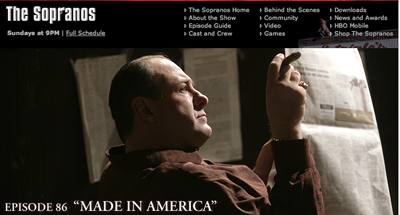 To me, the most amazing thing about The Sopranos – which is arguably the best TV show ever — (except for the way it ended) is that most of us hardcore fans had no idea how it would end. Despite the fact that millions of fans were waiting with baited breath for the final scene, probably 80% of the country has never seen The Sopranos. And therein lies a big lesson for marketers.
To me, the most amazing thing about The Sopranos – which is arguably the best TV show ever — (except for the way it ended) is that most of us hardcore fans had no idea how it would end. Despite the fact that millions of fans were waiting with baited breath for the final scene, probably 80% of the country has never seen The Sopranos. And therein lies a big lesson for marketers.
TV series like “I Love Lucy,” “The Honeymooners,” “All in the Family,” “Roots,” “Mash,” “Howdy Doody,” and scarce few others used to be seen by the whole country on one of the few networks. These shows added themes and characters to the general consciousness; theme songs to the all-time memory bank; and fashions, words and phrases to the lexicon; and sometimes, ads that ran on them also became topics of conversation. That, verily, was the golden age of Madison Avenue, which has since lost its creative spark.
Perception shifts like those are almost impossible to create in current popular culture, or in advertising. Rather than four TV networks, we’re looking at YouTube, Facebook, blogs, forums, networking sites, and any site that focuses on what we want to do or learn, or that offers us an amusing diversion from the daily grind.
David Hinckley, long-time culture critic for The New York Daily News nailed it today when he wrote
“…while we have more pop culture than ever, we have less of it in common. Huge chunks of pop culture today, from hip hop to instant messaging networks, might as well exist on a separate planet from the other chunks.”
And in a nutshell, that’s an important message for anyone who wants to sell a product or service today. And it’s also why traditional advertising, marketing and PR models aren’t working anymore. It’s a niche or be niched world out there.
No point trying to push the same message to everyone. You have to reach us in places we’ve gone to by choice or we’ll just tune you out.
UPDATE: Dear HBO: Send John back to Cincinnati!








I think that savvy PR and marketers also need to recognize the fact that there’s an ever-growing number of non-TV viewers. Or very infrequent viewers. Using TV show analogies on such people will evoke a blank stare at best.
These people are 404 from your established ways of marketing, and you’d best understand what 404 means.